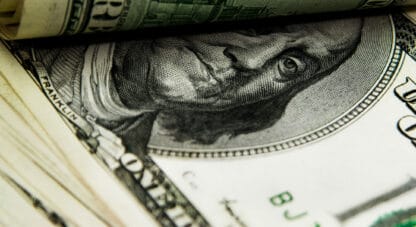About this week’s show:
- Mainstream Media Fails & Their Decline Begins
- What Kind Of Man Will President Trump Be & What Can He Do In 100 Days?
- 2017 Will Be A Good Year For Gold
The McAlvany Weekly Commentary
with David McAlvany and Kevin Orrick
“Capital grew over the last 35 years all over the world while labor was left behind. Now labor wants some of that capital back. So, is it higher taxes, is it a change in the structure of capital gains tax rates? There are a variety of ways in which fiscal policy can be used to redistribute wealth. That is the mark of the next 10-20 years.”
– David McAlvany
Kevin: David, this is, at least for me, the eighth morning after a presidential election since I started working for your family. What’s different about this one?
David: We’re saying it’s the morning after, except it’s not. As you listen to this program, it is recorded on Election Day, and you will, as the listener, know something that we didn’t at the time of the recording, that is, who is the new President of the United States. We’re assuming that the lawsuit which has been proposed in Broward County doesn’t delay a clear determination. We are, again, recording ahead of time.
Kevin: And Dave, we really don’t need to know the result to know what it means. You have half of the electorate completely shocked and furious. You have the other half of the electorate thinking it’s a brand new day. And I would imagine there is probably more polarization today, this day after, than we’ve ever seen in United States history.
David: That’s right. So, with half the country ready to either commit hara-kiri or leave the United States, swords have been sharpened, we assume, passports are packed, and (laughs) it’s just – what we want to do is come back on Friday and have a few comments as we close the week. We’ll just do a short five to ten-minute recap as sort of a supplement to this week’s Commentary.
Kevin: I think that’s a good idea. So watch your email. We’ll send you a post-election recap. But today it’s worth talking, Dave – actually it’s good for our listeners to understand that we don’t know the election results because the rest of the program we’ll try to give more of a bird’s-eye view no matter what the result is anyway.
David: And here is a quote I think is important from a man that trained the Clintons and has informed the views of the power structures, both in the RNC and DNC, from his post at Princeton, and at Harvard, and at Georgetown University, Carroll Quigley, a very significant shaper of thoughts in terms of public policy.
Kevin: Tragedy and Hope?
David: That’s right. The title of the book is Tragedy and Hope: A History of the World in Our Time. Very light reading, if you’re looking for something to read very quickly on a Saturday morning.
Kevin: (laughs) It’s only about seven inches thick, Dave.
David: 1300 pages. Mr. Quigley says this: “The chief problem of American political life for a long time has been how to make the two congressional parties more national and international. The argument that the two parties should represent opposed ideals and policies, one, perhaps, of the right, and the other of the left, is a foolish idea, acceptable only to doctrinaire and academic thinkers. Instead, the two parties should be almost identical so that the American people can throw the rascals out at any election without leading to any profound or extensive shifts in policy.” You have to understand that that kind of thought process is what occurred around the breakfast table as I grew up.
Kevin: Your dad used to say, “There’s not a dime’s worth of difference between a Republican and a Democrat.”
David: And of course, there is, marginally speaking, but if you look at the grand scope of the two platforms, you have rhetoric version A, rhetoric version B. And that’s what you need, good rhetoric to get elected. But when it comes to policy implementation, there has been very little difference.
Kevin: Right. There definitely is a difference as far as the coalition of people who believe one direction or another. The platforms are very, very important. The problem is, those who deliver or don’t deliver the platforms. Actually, they just sort of fade into history. I thought about it, Dave. I started working here when Reagan was in office. After that, the next election Bush came into office. After that, Clinton. And then another Clinton office came after that. And then Bush. And then Bush again. Obama. And then Obama again.
All those years, going back to the mid 1980s. And your dad, the entire time – this was a shock to me. When I came to work here I thought that this was a relatively conservative operation, and I found out that your dad didn’t like Reagan (laughs). It was strange. And then I talked to you and you said, “Yeah, well, you should have known my dad back during Carter.”
David: It’s always been proposed, by my dad, that he’s neither a pessimist or an optimist, but a realist. And as I look at his championing of different presidents, actually, in 42 years that I have lived, he has never liked any of the standing presidents – not a single one.
Kevin: And look at the direction of the country.
David: It makes me think that, whether that optimist, pessimist, realist appraisal is accurate or not, in his heart of hearts he is an idealist. He is a person with longings for something different and better, and he’s willing to look at any person and measure them, actions against promises, and say, “Are they delivering what they told us they would? Is this what’s best for the country?” The conversation came up in our house – I was just kind of joking with my ten-year-old (laughs) – I said, “So what if I ran for public office?” And he said, very soberly, “What would you do for the country? If you would do the right thing for the country I would support you.”
Kevin: His own dad.
David: (laughs) Yeah. There is this contingency – “I can support you if you’re willing to do what’s best for the country.” Now, today, are the results being contested? We don’t know. Election fraud is nothing new and this year there is a lot at stake. There appears to be more than the usual chicanery.
Kevin: Oh, the establishment seems to be completely panicking.
David: I mentioned the Broward County issue. The Trump folks, earlier in the week, were getting ready to file a lawsuit in Broward County because they had found a secret room where votes were being actually written out by hand by the Democratic Party, just very interesting things in terms of election fraud.
Kevin: But Dave, does it seem to you a little bit like the Medici family, in power for so long there in Italy. I think what we saw is, the cards have been uncovered that they thought maybe they might lose the power here.
David: It feels like a Brazilian political flashback, like we’re recreating a North American version of crime and corruption that is now sort of openly in view, like we’ve seen in Rio in recent years. So yes, the Medici family motto: “Money to get power, and power to protect the money.” And I think what you have in this election cycle on both sides of the aisle is politics, which is an inherently dirty business, and we’re right in the middle of that vortex of money, and power, and the people who want to control it.
So for the next 90 days we’ll find a variety of disturbing revelations – the appointments that are made, the favors that are paid back, and even potential indictments that occur, as we look at the Attorney General’s office, the Justice Department, and the FBI. There are a lot of things that are in motion today.
Kevin: Dave, one thing that won’t go away, and whoever is president is going to have to hold the bag on what is going on economically, we’ve seen the Dow for about 700 days now, sort of stuck in this one range. We knew that it would need to go down, but of course, because of the election, that fix comes all the way to, well, let’s just say, today. Now the fix is off. What happens in the lame duck cycle when now the Federal Reserve can possibly do something that would not affect an election for the next four years?
David: I think that’s very interesting. We have the social and political issues, the obvious differences between the policy-pushers the next four years, and we know the difference in agendas that are afoot. That much is obvious. The added common denominator between the two candidates is that they share an economic backdrop that is dangerous. Regardless of who the winner is, there is a market which, here in the U.S., has gone up for eight years, and that with nearly zero hiccups along the way. So, your comment earlier – yes, I agree with that wholeheartedly. In summary, someone will get caught holding the bag, and I, frankly, don’t envy the winner on that front.
Kevin: It is clear, though, that Wall Street, particularly favored the Clinton side of things.
David: The way the market has traded over the last week, really, a week to ten days – has revealed the Wall Street preference for Hillary Clinton.
Kevin: You can see the connections from behind the scenes.
David: Yes, we discussed several weeks ago the continuity of policies, if you had a Democrat taking over from a Democrat, and that certainly gives Wall Street less heartburn, because it is sort of a degree of status quo that can be counted on. Again, my ten and eight-year-olds have repeatedly said, “Trump’s a bit of a loose cannon. Both of them are liars. But we prefer Trump.” That was their opinion.
And the fact that Trump has roiled the market for nine consecutive days as he took the lead in many polls, and as the email scandal sort of re-emerged, as Comey brought that out around the time of Reformation Day, or Halloween. That was the day that Martin Luther was nailing his 95 theses to the door. At least, that’s the day that we remember it. And it is also the day that Comey said, “Uh, well, we actually have a little bit more review on 650,000 emails.”
Kevin: Let’s look at that for a second – 650,000 emails. Dave, I probably get 70 or 80 emails a day, and it takes me quite a while just to delete them and not read them. How do you get through 650,000 emails in nine days?
David: That was the beginning of the down-tick in the stock market. Interestingly, it went through a nine-day stretch – a nine-day stretch of declines which actually is the longest series of days, sequentially, the market was in decline on record. Not necessarily by depth – it didn’t drop that far – but nine days of decline was marking, again, Wall Street’s view that a Trump victory is going to be a rocky road ahead.
But it was interesting, yes, you had that issue re-emerge on Mr. Weiner’s laptop – 650,000 emails in total – which if you look at that nine-day stretch of declines, would imply, if there is a surprise victory by Trump we’ll have the market back on its heels. But my long-held view is that neither candidate can avoid a significant market decline as prices catch up to economic reality. And that’s regardless of Democrat or victory by the Republicans.
Kevin: Let’s just restate what you have been saying. Stocks have been going up, or at least going sideways now for a couple of years, but revenues, the actual tax receipts, which is a way to determine whether people are making money or not – that has been going down.
David: Sure. QE ended in the fall of 2014, and stocks have been sort of listless, moving sideways, in a range around 18,000 for some time, and that is with massive routine interventions – massive routine interventions – which have kept prices from declining, but have not taken them to new heights. And you’re right, stock prices are relatively stable at a high level, tax receipts of the Fortune 500 companies have been in decline for two years. And this is absolutely critical – keep this in mind – follow the real money trail. The real magic over the last several years has been engineered by perceptions, engineered by stock buy-backs, engineered by this idea that earnings-per-share is constantly improving.
Well, 2.1 trillions dollars has been spent in stock buy-backs, which has given market participants the sense that things are improving, and from one vantage point they are. Yet, if you’re looking for real growth – let’s talk about tax receipts – if a company is making more money, you find it on the bottom line. And in fact, we’ve had two years of a decline in tax receipts, even as the stock market has continued to move higher. That’s a dangerous situation to be in, and why we would suggest that stock prices are about to catch up with the economic reality companies have been facing for 24 months.
Kevin: Wouldn’t you say tops of markets show declining revenue first. Tops of markets also show fewer, and fewer, and fewer names at the top. Everyone else is falling. Right now we have that same thing. It’s a very, very sparse roomful of companies right now that are actually doing well on the stock market.
David: Yes, and it’s funny. You always have to come up with something cute and quippy to describe those – it may be the nifty fifty. Right now it’s the FANGs. The FANGs are Facebook, Amazon, Netflix, Google, which has been renamed Alphabet, but they still keep the old acronym. It’s those names that are holding the averages higher. And those few names – they are over-owned by every investment advisor and asset manager, and while they’ve held the market at high levels, you’ve seen a broader deterioration.
If you’re looking at the New York Stock Exchange index of 2000 companies, you’ve already seen a significant decline from peak levels in the broader market, but those few names with high concentration in the indexes have sort of kept the indexes, overall, at an elevated level. So, this, I think, is a repeating pattern from previous market tops. What should you do? You should avoid the acronyms (laughs). Avoid the names in the acronym, because if they are the most over-owned, they have the tendency, when selling ensues, to be sold in proportion to their weighting in a portfolio.
Kevin: In other words, you need a buyer. To have a seller, you have to have somebody who is going to come in and buy that.
David: There is an interesting market dynamic relating to unique events which have happened this year. Specifically, we’ve had an election, and we’ve had the Olympics, two of the most popular in that list, are going to face an interesting year-on-year collapse in advertising revenue. Because again, the Olympics were a big deal, and the election is a big deal, and with those two things behind us, we’ve got two that are even more vulnerable shifting into 2017 than they would have been in 2016. The outcome of the election shifts the market decline from the present to 2017, and that, I think, is the key, fundamental market difference between who wins and who loses. There is hell to pay today if Trump is elected, and there is hell to pay in 2017 if Clinton is elected.
Kevin: Either way you don’t dodge the bullet.
David: You don’t dodge the bullet. It’s just the question of now or later.
Kevin: I want to go back to the question on the 650,000 emails. I’m sorry, I was just shocked with Comey came out on Sunday and said, “We’ve seen nothing new.”
David: Can you imagine the political pressure that came over?” It’s interesting. You have Mr. Obama foaming at the mouth, and you just know that threats have been flying behind closed doors.
Kevin: I was thinking about it. It probably was a call from someone that was unidentified.
David: Could it have been Jarrett?
Kevin: It could have been – with a voice changer – and it says, “Do you love your daughters?”
David: (laughs)
Kevin: I mean, something – how do you get through 650,000 emails, reasonably, in seven, eight, nine days?
David: I tweeted a comment – I actually do use Twitter on occasion. I tweeted a comment on Monday, and I was asking, “How thorough a review was made, if in that eight-day period – do the math, eight days contains roughly 690,000 seconds – each email was analyzed?
Kevin: In a little over a second.
David: That’s right, approximately one second per email. And I’m sure it was an impartial review, I’m sure it was done with the highest deliberation and care.
Kevin: Oh sure.
David: (laughs) I’m going to remember the weekend before the election as a legacy move by Comey. And I’ve thought about it this way. This is a new beltway expression: Comeynism. The truth brigade would be proud, if Pravda were doing their review of this particular version of Comeynism. I think he’s done an amazing thing.
Kevin: Dave, there is something very sobering about this election, no matter who the winner is, and that is, we’ve seen an exposure of the press, just overwhelmingly slanted to one side, but we’ve also seen real issues in the FBI, we’ve seen real issues in the Department of Justice. This goes right to the top. These are the people who were supposed to protect those people that they are supporting, but in reality, if an FBI agent came in today and you were accused of something, how much would you trust that system?
David: We have folks who know the Internet well who would say, blaming the Russians is a total ruse. That is an absolute joke. And as the facts are being collected, insiders with the NSA are the folks who have leaked emails and given us greater insight into the concerns and issues developing at FBI, DOJ, and with the Attorney General’s office. And look, the lingering issue seems to be that when people witness the breakdown of the law and the abuse of power at the top, it doesn’t inspire respect.
This brings me to one of the core themes of this campaign. You’ve had the popular perception, which is that D.C. insiders are the epitome of corrupt money-grubbers, and there is disdain amongst the elite for the little people. The elite have a clear agenda, and have taken that agenda and the opportunity to abuse power, and in the process have gained massive personal fortunes.
We’re at the end of several cycles, the end of a credit cycle. If you wanted to go back to the old Kondratiev waves, maybe we’re at the end of a Kondratiev cycle. To borrow from Strauss and Howe and their book, The Fourth Turning, we’re at the end of a fourth season, or a fourth turning, where you begin to see things break down from a social and political level. So it’s not uncommon when you get to the end of a cycle like this where people start doing things that are incredibly dishonest. There are more and more people like Bernie Madoff, and it’s not a surprise at all to see corruption reach new heights in the political sphere, as well.
Now, in terms of gaining personal fortune, Trump is not exactly a part of that crowd. He is not climbing ladders the way the Clintons have. (laughs) Quite frankly, he prefers to build them, and own them, and lease them to you, right?
Kevin: It seems like he’s done a lot of that without political connection.
David: Right. I remember sitting in the Trump Hotel in Vegas, wondering why it had no casino, and the answer was simple. In that town you need all kinds of connections, legal and otherwise, to get your gaming license. And he could not get them, which told me something about him as an outsider. By the way, if you like a quiet oasis in the chaotic cacophony which is Vegas, try the Trump Tower. And that’s not an advertisement, it’s just a reality. No casino makes it a little bit better.
Kevin: Dave, sometimes it’s hard to have a perspective when you’re in this election cycle. I’ve found myself, for cathartic reasons, watching a lot of political TV, listening to the radio, so much so that my wife, who also listens to all that, had to tear me away. She said, “Go do something else.” So Sunday night I literally sat down and read the entire Book of Job at one sitting. It’s a dark time, and Job is a good, hopeful book during that particular period of time.
David: I was reading 20,000 Leagues Under the Sea to the kids. You have this massive attack between these technically advanced outsiders and these giant squids, right?
Kevin: So you saw the analogy.
David: I did (laughs).
Kevin: Well, and then yesterday, I think I told you, I sat down and was reading Frederic Bastiat’s, The Law. I think everyone needs to do that at least once a year to determine what the law is for. You’re talking about corruption at the end of a cycle. The law is quite simple. The government is for one reason – the government is to protect those who are good, and to punish those who are evil. When it stops doing that, when it starts punishing those who are good…
David: And protecting those who are evil.
Kevin: And protecting those who are evil, you know that you must be at the end of a cycle.
David: The issue we’re touching on is a deep one, and it’s not just the U.S. issue. This is not about U.S. politics alone. A part of that is, we’ve spent the better part of 35-40 years in a massive wealth creation phase, and I think it’s fair to say that the distortions and the vast differences in outcome have set the backdrop for years, if not decades, of rancorous politics. Because now what you have is income inequality, with haves and have-nots basically in conflict in a way that we haven’t seen in decades.
Kevin: And what do you see when we see that kind of conflict? You see the cry for redistribution. “We want some of that.”
David: Right. So, in essence, what you have in this election, regardless of the outcome, is, again, the have-nots on the warpath, and the haves, who should be adjusting their expectations to being in a new era of wealth distribution. That will happen via monetary policy – it’s already in motion – and with the next round of equalization to occur via fiscal policy measures, as well. We’ve spent close to four decades in a wealth creation mode, and politicians accommodated that with free trade and with increased global flows of capital and goods, and that era is over.
Kevin: Yes, you feel the nationalism setting back in – statism and nationalism.
David: Right. So, the expansion of globalization has sort of reached its outer edge and is pulling back. And it’s being demanded so by domestic political interests and politicians that are catering to those that have been left behind. And not just left behind in the income category, but left behind as globalization has shifted jobs to far-flung places. And that, by the way, is the market – okay, this is just kind of a pet peeve, but free markets seek efficiency and growth. Labor arbitrage is not an evil component of globalization, it is an expression of the free markets and was a significant contributor to the balance sheet growth which investors participated in throughout the 1980s and 1990s.
Kevin: Right. It is used as a political tool, obviously, for votes, but actually, it is counter to what would be conservative or free market mindset to call for protectionism.
David: But I’m always fascinated by the pro-American anti-free market positions championed by conservatives, in some instances, who try to position themselves as market-friendly, but hate free trade. What they should hate is cronyism. What they should hate is debt-driven growth, and an addiction to debt which sets in motion very unhealthy dynamics in a market economy. So if cronyism is in the equation, then and only then is criticism of free trade justified.
You recommended, The Law. I say, yes, go back and re-read The Law. If you are in a post-election pity party, please go back and read The Law. If you don’t know what the law is, then educate yourself. One of the most important books in the last 400 years is written by Frederic Bastiat. But go back and read Economics in One Lesson, as well, by Henry Hazlitt. Hazlitt makes the case that specialization and free trade are of incalculable benefit.
Kevin: But let’s face it, we’re probably going back to a fiscal policy that says, “Let’s go ahead and build a dam or a bridge, even if it goes nowhere. Let’s carve faces on mountains. Or we could just start an old-fashioned war. Let’s spend some money.” Hazlitt addresses that, as well. He calls it “the broken window paradox.”
David: That’s right. The broken window fallacy is where we are actually trying to create economic growth by doing things that are more or less neutral, because what have you advanced if you break a window and fix it? You have created economic activity in the midst of fixing the window, but you have advanced nothing and nowhere. It is interesting. If you look at the European issues still faced today, and because Mario Draghi has been willing to be so free-handed with monetary policy, it has taken the pressure off politicians to do anything in terms of fiscal policy rearrangement.
Kevin: But when monetary policy stops working you have to move to fiscal policy.
David: Right. It’s this fact that politicians are reticent to use fiscal policy aggressively or overtly because of career risk. When you introduce career risk, what we’re talking about is enfranchising some people, disenfranchising others. How are you spending money? Is it to my advantage? Is it to my neighbor’s advantage? Am I happy about that? Am I critical of that? People have to create a safe space in which politicians – not the safe spaces you find on college campuses (laughs), this is a different safe space – but politicians are not willing to take the risk unless people create a safe space for them to step into.
Kevin: Where people cry out for a solution.
David: Yes. For example, you have market chaos, and the fear that accompanies it. That might be something that sets in motion a fiscal policy spending initiative. Or the type of environment set in motion by 9/11.
Kevin: Where you fear a new enemy.
David: That’s right. Fear reigns, there’s a knee-jerk call to patriotism that blots out a lot of careful reflection, and our leadership is given both a blank slate for new policies, and a blank check to implement them.
Kevin: Dave, the 1960s and the 1970s were a period of huge fiscal spending here in America. I remember, anyone who was born in the 1950s or the 1960s – I was born in the early 1960s – we were absolutely sure that the Russian threat was a true threat. And so we had this huge buildup of arms – the Cold War – and there was a lot of fervor. The people were calling out for it. Little did I know, years later when I read the history of John von Neumann, Rand Corporation, that really, the entire Cold War decision of keeping us fearful of the Russians – not that there’s wasn’t some threat – but the decision to keep us fearful and on edge actually was a mathematician’s formula called Game Theory. It turned out to be called Mutually Assured Destruction. They basically assured us that if we started a nuclear war we, of course, would be decimated by Russia.
Now, you brought something up a couple of minutes ago before we started recording that I thought was interesting. We actually face a much larger nuclear threat today. Pakistan has nuclear arms. You have Middle Eastern countries that have nuclear arms, or are close to getting them, like Iran.
David: North Korea is a growing concern.
Kevin: But the mathematician’s formula of Game Theory doesn’t work unless you just have two super powers, so we don’t hear much about that. And it really doesn’t lead to much fiscal spending. What is the next Mutually Assured Destruction, or Cold War cry from the people, that actually was formulated on a mathematician’s table?
David: I think that’s the point. We have academics and policy-makers who, with support from the media, define a threat, and we end up being, the electorate, like so many ping-pong balls, tossed over the net, back and forth, and back and forth, emotional about this issue today, emotional about that issue tomorrow. And we don’t realize that we’re being played. We don’t realize that the threat is not the threat. Whatever the threat is – that’s not the threat (laughs).
Kevin: But the transition is still coming. We’re going to transition from monetary policy to fiscal policy, so we need to grasp that.
David: That’s true. What makes that a vital transition is, it’s not only a change in tack for our leadership, but it’s also a change in target. The goal, globally, by the political elite, will be to quell the populism of the last two years, and take control of the reins again. There is a great insecurity amongst the power structures around the world as they’ve watched the Internet undo power structures. Not only did we begin to see this in the Middle East with the Arab Spring, but you look at the WikiLeaks’ back and forth, and this election has been more up for grabs than probably any other in history.
Kevin: Look at Europe, with Brexit. You have all of these things that are starting to show that the people have a power of knowledge. It reminds me of 500-600 years ago when Gutenberg started printing books. At that point there was a severe threat to anyone who was in power at the time who was really relying on controlling information.
David: One of the unfortunate consequences of this particular election, regardless of who wins, is that we’re going to see the death of freedom on the Internet. And that is absolutely necessary for the political elite because free speech they have found to be incredibly destabilizing. Think about this. The establishment is more in fear of the people, and populism, in the United States, in France, in Italy, in Britain, in many of the powerful countries around the world who have elections in the next two hours to 24 months. There is a lot of political change. And freedom, which has been a part of this Internet exposure, has remade the election. It has remade it. And the power structures don’t like that.
Kevin: It’s a little bit like the brochures of Thomas Payne. If you go back and look at – here is this rogue guy actually printing the truth and handing it out to colonists, and it actually really fueled the Revolutionary War.
David: This is why I started with the Carroll Quigley quote, because the best outcome for the establishment is that nothing changes. Even if the party changes, nothing changes. And the fact is, the Internet is changing the structure of politics, and changing the way parties even have to position internally. And that is not something that is tolerable to the RNC, that’s not something tolerable to the DNC, so you’re talking about a radical shift over the next few years to completely change the infrastructure of the Internet so that people don’t have access, can’t say what they want. Because otherwise, this stuff happens all over again in 2020, and I don’t think either party wants to see that happen.
Now, I’m talking about the party elite. I’m not talking about the average voter who is saying to themselves, “I’ve had more information to work off of than any other election.” And that’s because people have made disclosures via the Internet that we never would have had before. This was top-secret information (laughs) and now it’s commonplace, and I can find it on the Internet.
Kevin: Dave, you know, about 100 years ago, if we were go back, we could look at radio waves being something similar to the Internet. As you know, I have my ham radio license. I have to have a license, with a call sign, so that I can operate on the radio. And I have rules and regulations or I’ll lose that license. They had to do that because the radio airwaves had become a free-speech device. Even as a ham radio operator I can’t use any kind of code that a person listening on the other side can’t understand the message. Now, this election, we’re following on the heels of Brexit, and so you’ve seen this free speech coming out on the Internet, and we have other movements that are still brewing that are past the election. You have WikiLeaks that will probably continue to leak on other areas that are going to manipulate society.
David: Oh sure, we have the issues relating to the Clinton Foundation, which have been anything but resolved. I don’t want to get into all the details of things that we have in the U.S. because it’s the same in terms of there being critical votes in Europe, not only through the next couple of months of winter, but into the spring. And what you find, both in the U.S. and in Europe, is a growing trend of disenchantment with the status quo. Polls have not adequately captured that undercurrent.
Why was Brexit a shocker? It was a shocker only because the pollsters inadequately sampled a broad spectrum of people. And the broader the spectrum, the deeper the sense of being left behind. While this is an acute sentiment post global financial crisis, it is something that has been building over a 35-year period. Again, this is people being left behind, this is people looking at a wealth gap and saying, “Something is not right here.” This is populist sentiment saying, “No, what’s good for the city is not good for the country boy.”
And so, one anecdote that I think supports this – you have executive pay which over the last 35 years has gone from 30 times the average salary, to now 300 times the average salary. So, the average man has basically seen little to no uptick in real income since the 1970s. Your typical family, blue collar, middle-class worker, whether it’s in Britain, or in Canada, or in the U.S. – you’re talking about folks that have been left behind. Meanwhile, you have the pressures of increased healthcare, you have college tuition and housing which continue to climb at rates that far exceed the average inflation estimates. And it underscores the sense of not being able to keep up. So whoever wins the election this year – keep in mind that there is a global issue, and that global issue of a gap between rich and poor has been brewing for 40 years.
Kevin: I think the way that they’ve been numbing the pain of this gap getting larger and larger, and living standards actually needing to drop when they didn’t, was debt. As long as you can borrow money, Dave, you don’t really feel the pain of poverty.
David: Right. So, the real significance of the global financial crisis, as the first shoe to drop, with one still to drop – the real significance of the global financial crisis was to reveal just how much this income gap has been covered over by access to the credit markets. That is so critical. Household debt has soared and it has filled the gap in income. What has that allowed? That has allowed for a lifestyle to be maintained, and sort of an equivalency from one year to the next. What the consequence is, financially speaking, is a lop-sided balance sheet for the hoi-polloi.
The common man now has assets which are insignificant, savings which are insignificant, and debt accumulation which has been massive – off the charts – and very significant. But this was allowed through an adequate refinancing of a home, the use of home equity lines of credit, the abuse of credit cards. The reveal here is that income inequality has been a massive underlying issue for a long time, but not an obvious one due to ready access to credit.
Kevin: But it has now turned into populist rage, Dave. I can’t think of another word. There is populist rage. It doesn’t matter the outcome of this particular election. People are furious.
David: I know. And this is so typical of what you find in terms of social sentiment at the end of a credit cycle. You get to the end of a credit cycle and this stuff is normal. I’m not saying it’s good, I’m not saying I like it (laughs), it’s just normal. It’s what you get. Par for the course. Populism has emerged globally. And that is, again, an issue. Not just the U.S. election, but populism has emerged globally and quite aggressively in the wake of changes to the credit markets. Not only is credit not growing in the household sector, but monetary policy has driven asset prices to the moon, so that the have-nots are insecure in their financial standing, and the haves are chest high in clover. Kevin, they’re not just knee-deep in clover, they’ve never had this much wealth before.
Kevin: We’ve never seen so many billionaires, and we’re probably going to have somebody hit a trillion at some point here. But Dave, you have always recounted the four-step process, the financial crisis cascades into an economic one.
David: It begets a political crisis.
Kevin: Political, and then unfortunately, blood flows because it turns into a geopolitical crisis.
David: Typically, a political crisis is resolved at the end of a long and painful road, in a geopolitical crisis. And it’s characterized by scapegoating. It’s characterized by blame-shifting at the highest levels. And you find, at the core, distrust. Trust opens borders. Trust opens trade. Distrust closes borders. Distrust rearranges those trade agreements. The pendulum swings from one extreme to the other in a long-term credit cycle, and we are a part of a credit unwind. We are actually in the middle of a credit unwind, with all the price corrections still ahead of us.
Kevin: And you brought out that it’s a global issue. I think we can sometimes become myopic here in the United States and think that everything just hinged on the U.S. election. This is a global rage.
David: It is. It is beyond a national one, and I’m certainly no champion for redistribution. What I’m saying, as an observer, is that the atmosphere is ripe for redistribution, and the popular voice is wanting a level playing field, which roughly translates as “gimmes” of one sort or another. Capital grew over the last 35 years, all over the world, while labor was left behind. Now labor wants some of that capital back and politicians represent the most civil means of extracting that capital. So is it higher taxes? Is it a change in the structure of capital gains tax rates? There are a variety of ways in which fiscal policy can be used to redistribute wealth. But that is the mark of the next 10-20 years.
Kevin: Dave, in the last couple of weeks I’ve had several clients send me reports that seemed very intelligent, saying, “Hey, you need to understand, that national debt, the debt globally, is really not much of an issue, as long as a country can print money and pay itself back, like we do here in the United States.” What that discounts, when a person believes that kind of rhetoric, where you can go into debt as far as you want if you’re a reserve currency country, and just print the money and pay yourself back in your own currency. What that ignores is inflation. During this period of time while we’ve done this, since 1971, since we went off the gold standard, the U.S. dollar has lot over 90% of its buying power. Would you call that inflationism? It’s a way of putting on the backs the debt repayment without them even knowing it.
David: Here’s the problem, Kevin. I think, for those who say that inflation is benign, you have to look at the consequences of inflation and say that, actually, the consequences are very significant. With the death of money comes the death of civility. With the death of civility comes the death of values. Not just the change in value because of the change in currency. When you destroy a currency you end up destroying the heart of that people and the heart of that country. Again, death of money, death of civility, death of values, not just the death of value.
To quote our friend Doug Noland, who, if you want to read him, you can now find him at mwealthm.com – he has joined our team – our nation and the world are paying a heavy price for a failed experiment. This is Doug’s comment over the weekend? “At this point, the economic stagnation, wealth redistribution and inequality, financial insecurity and corruption, are rather obvious consequences. Money and credit have inflated right along with government securities markets, financial institutions, corporate influence, and greed.” And then in this weekend’s comments he does go on to say that “We are witnessing the repercussions of a prolonged bad cycle of playing with society’s psyche. What he said is, we’re inflating untenable expectations, only to see them crushed by the fist of bursting bubbles.”
Kevin: There is a fear driver right now. I talked about rage, but a lot of times rage comes from fear of the unknown. I’ve read polls here recently that say the majority of Americans – Democrat, Republican, Independent, it doesn’t matter – the majority of the Americans don’t trust the government and they think we’re headed the wrong direction. They’re fearful.
David: Right. So you have the reputation, the level of trust put in government, and in the media, by the way, reaching a low ebb. Look, people aren’t reading anymore. The Wall Street Journal just this last week announced that they’re consolidating sections in the Wall Street Journal because they don’t have enough advertisers. Why? Because they don’t have enough readers! So the Wall Street Journal is becoming just as irrelevant as CNBC whose ratings are at 22-year lows. Why? Because they don’t trust the information. Media has lost its voice, like government has lost its position of authority. And we’ve entered into a danger zone where fear drives political trends, it drives market trends, and it even drives geopolitical trends.
Kevin: Right. “Mad as hell and not going to take it anymore.”
David: Right. So the mad as hell vote decided Brexit. And regardless of the U.S. election outcomes, we see the establishment fighting for their lives like they haven’t in a long time – if ever. The mad as hell vote expresses itself in the Trump candidacy. And it’s only going to grow louder, assuming that he lost. I don’t know. But in terms of market volatility, as a company, we see long periods of anger, of distrust and volatility ahead of us.
Kevin: Okay, but David, we’re getting fired up. And one of the things that I’ve always loved about your dad, you, and your family, is that you put things in perspective. It may look like the entire world is falling apart. It may look like the Titanic is sinking. And no one conveys that better than your father and you, to build up tensions sometimes, but I can also say, you need to be there for the rest of the story. Because whenever we’ve had meetings over the last few decades, it’s like, “Okay, guys, now that we’ve gotten that out of our system, let’s look at what’s important.” I know that you sat down with your kids through this election cycle and you talked to them and discussed the things that were really important, and it really had nothing to do with the election.
David: Well, it does have to do with the election, but it doesn’t. The morning of the election I’m sitting with my four kids, and as I told them this morning, at the end of the election, regardless of who wins, none of the things that matter most in life will have changed. I love them, and I want to know them more. Our relationships and our disposition toward the world around us remains the same. And when I look at our hopes and dreams, they have never been tied to a political figure. They have never been tied to a particular party. We can flourish, if we choose, in a utopian system. We can flourish, if we choose, in a dystopian world, not because of the world, but because of our disposition, and the choices that we’re committed to individually in that world.
Because, you see, our hope transcends politics. And consequently, I’ve encouraged my family to look at relationship as foundational, as a given, something that is not contingent on agreement, that doesn’t require acquiescence to other views. We can disagree and we can love each other all the same. That’s how I was raised. When we disagreed about a politician, or a particular issue, or a philosophical issue…
Kevin: Which still happens.
David: Or a theological issue, the person and the relationship are never in play. And we can argue different sides of an issue, but at the end of this what I want my kids to see – in the end, my neighbors may be crazy, and some of my best friends may be lunatics, for the way they voted. They’re still my friends, they’re still my neighbors. Is it so novel to conceive of living life with people that you don’t agree with? (laughs) What we share outlasts the present political party representative, and what our future as a family holds does not depend on the election outcome. So, what matters most is not at stake.
And at the end of an election, I’m not particularly perturbed. Either way, the things that I care most in life about, I’m deeply committed to, and I’m going to continue toward regardless of the election outcome. What am I going to do tomorrow? Half the United States is now in crisis because their person did not get in. You do the next thing. If you’re in personal crisis because your person didn’t get in, you do the next thing. And that next thing is the thing that you’ve always valued and committed to.
Kevin: Three or four years ago, Dave, your family took me out when we were in Southern California, down in Newport, to a crab restaurant that you had family history with. I think your dad had actually said, “Hey, do you want to drive to the Crab Cooker?” And you were in San Francisco at the time and you literally drove the entire drive just to go to the Crab Cooker.”
David: Yes, seven hours, because it was a habit. We were nostalgic (laughs).
Kevin: But I wrote something down. I went back there later, alone, the next year that I went to Newport, and I went to the Crab Cooker because I had a good experience with you guys there. And I read this saying that was on the wall. It said, “It’s important to keep the most important thing, the important thing.” And that’s what you’re trying to say at this point. We, as a nation, Dave, are being encouraged almost toward civil war. I hate to say it, but that’s what I’m feeling. And you talk about a political shell game, the establishment may be scared, but they can also used people’s disagreements with each other for their agenda. We’re still Americans, and relationship needs to be built on something more than political views.
David: The political machine was designed to manipulate, control, and create a sense of fear so that we are constantly reacting to something that is very dramatic. And in this case, it is actually over-dramatized. Nevertheless, it sucks people in to commitment. A commitment to one party or the other.
So again, that notion that Carroll Quigley had so presciently written about – actually, there really is no difference between the parties. We need people to be throwing out the evil people who were in power, and bringing in the great new salvation. But in reality, there should be no extensive shift in policy. That is the reality.
And to the degree that we’ve been sucked into that manipulative, controlling, and fearful environment – guess what? You have allowed the political machine to make the most important things irrelevant, and you’re focused on things that actually are, truly, irrelevant.
















